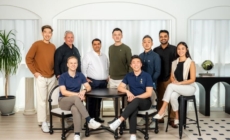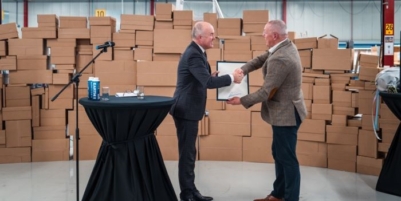-
BLACKOUT TECHNOLOGIES TARGETS TELEMATICS-INTEGRATED MOBILE DEVICE BLOCKING TO COMBAT SMARTPHONE DISTRACTION - 17 hours ago
-
Sparck Technologies awarded Royal designation - March 27, 2025
-
OpenADR Alliance announces first OpenADR 3.0 certified products with EVoke Systems, E.ON Energy and Universal Devices - March 25, 2025
-
Growing fulfilment and contract packer appoints new Managing Director - March 25, 2025
-
When is it time to invest in a WMS? Understanding the key trigger points - March 25, 2025
-
eCapital helps Vantage Recruitment on its journey to financial success - March 24, 2025
-
Hugo Beck Celebrates 70 Years of Packaging Innovation with Open House Events - March 20, 2025
-
PROLOG FULFILMENT SUPPORTS LUNA DAILY’S COMMITMENT TO BETTER BODY CARE FOR ALL WOMEN - March 19, 2025
-
Motion Ventures launches largest-ever maritime tech fund at $100M to meet the industry’s new pace of adoption - March 18, 2025
-
ITD GLOBAL APPOINTS GROUP CHIEF REVENUE OFFICER - March 17, 2025
- Retail one-to-ones happening frequently yet performance-centric conversations fail to address employee needs
- ‘Work-life balance’ and ‘wellbeing’ revealed as the two topics that retail workers most want to talk about with their manager
- One in three (33%) customer-facing employees says employer is not doing enough to support their wellbeing
- Retail industry faces up to 40% churn as ‘undervalued’ employees seek better experiences elsewhere
Research released today reveals that manager-employee conversations are failing to address the topics that matter most to retail workers. Respondents cited ‘performance objectives’ and ‘performance ratings’ as the two most dominant topics of conversation despite ‘work-life balance’ and ‘wellbeing’ being the two issues that employees most want to discuss with their managers.
The research, which polled 500 retail employees across the UK in May 2022, was conducted by OpenBlend – the platform for effective conversations at work, and suggests retailers need to enable more holistic conversations that cover a breadth of relevant content beyond just performance. In line with this, 92% of retail workers agreed that one-to-ones should be a balanced, two-way conversation yet just 37% are encouraged to set the agenda for their one-to-ones.
On a more positive note, the research reveals that the frequency of one-to-ones has increased across the retail industry, with eight out of ten (83%) employees now having a conversation with their manager at least once a month. However, with one in three (33%) customer-facing employees saying their employer is not doing enough to support their wellbeing, these findings show that frequency alone is not enough to support effective conversations and outcomes.
Commenting on the research, Anna Rasmussen, Founder & CEO at OpenBlend, said: “While it’s great to see that retail workers are talking to their managers more frequently, this research confirms that regularity, at least in isolation, is not supporting people to reach their full potential. Frequency is important but it only adds value when it’s underpinned by broad conversations that enable employees to take an active role in discussing the issues that matter most to them.”
Survey results also highlighted the retail industry’s ongoing retention issues as 21% of respondents said they plan on leaving their job within the next 12 months, while another 19% are still undecided – findings that threaten a potential churn rate of up to 40%. Of those who said they plan on leaving, ‘feeling more valued’ was cited as the top factor that might persuade retail workers to stay (60% of respondents chose this option), followed by ‘increased financial reward’ (56%) and ‘better work-life balance’ (51%).
On the topic of technology, well over than half (56%) of those polled said their one-to-ones are either not tracked at all (25%) or are recorded using pen and paper (31%) – statistics that suggest the retail sector may be lagging behind other industries when it comes to the adoption of people technology. This is despite 7 out of 10 employees agreeing that technology is ‘important’ or ‘very important’ for supporting effective conversations at work.
Rasmussen concluded: “The solution lies in understanding and catering to the individual’s unique needs and wants – and in today’s employee-led market, retail workers have come to expect these personalised experiences. The hard truth is that retailers who do not have the right tools and technologies in place will find it much more difficult to ensure their employees feel heard and valued in the race to retain talent.”
































